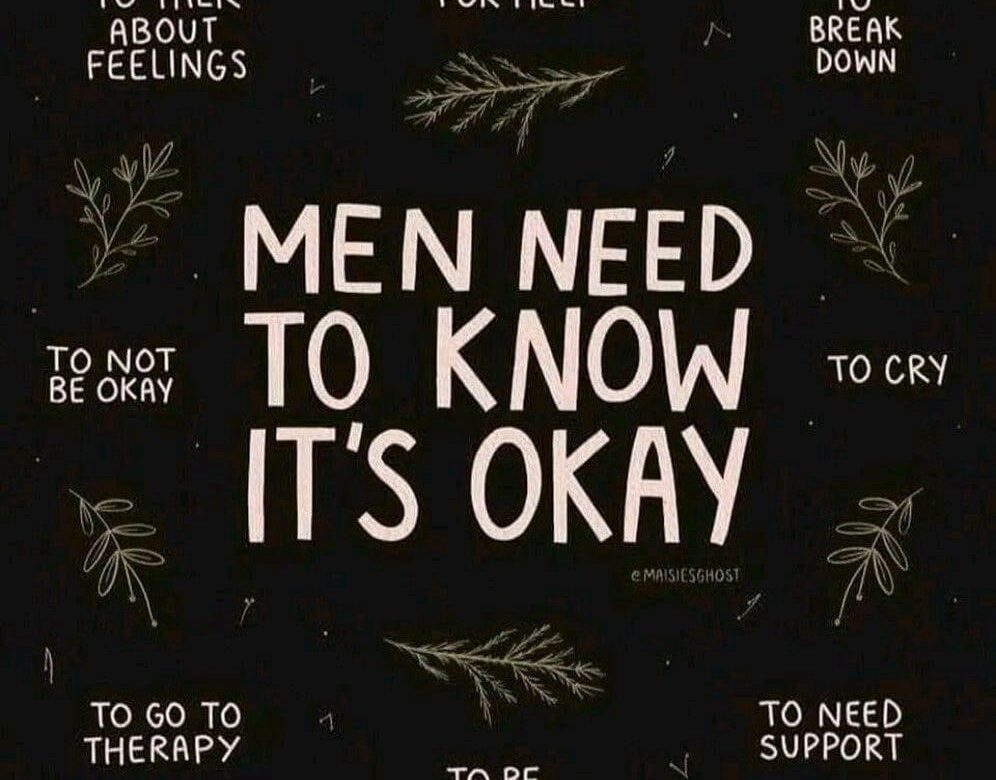Men’s health in focus
We see an increased focus on men’s mental health in society and this is with good reason. The facts don’t lie that men still seem to suffer perhaps silently with mental health issues and struggle to reach out for help. When we look at the suicide statistics in the UK they show that men represent 3 quarters of the total number of completed suicides and the suicide rate in men has been increasing since 1990 (Office for national statistics, 2018). It is clear that there is something specific to men that is causing this to happen. Looking at these statistics can be quite troubling; what is it that is pushing men to feel they have no options but to take their own life? In this post we will explore some of the issues specific to men as well as some actions that we can all take to try and tackle this issue.
Social expectations
While men are just as social and outgoing as any other group in society there is often a stigma that comes with being vulnerable as a man. This can start in early childhood when we send messages to boys, innocently enough, telling them to be brave. How many times have you heard a man told to ‘man up’ when they are finding something difficult or are upset. We also expect boys to express themselves more through anger than through sadness. This unconsciously leads to people around boys to find anger more acceptable than being upset. In many ways we have still not escaped the societal expectations of the man being the sole breadwinner and protector of the people around him. This idea of what man should be can be distressing if you don’t or can’t fit into the very narrow mould being shown to you.

Financial pressure
This links into the social roles and stigmas that men face of having to be the leader or protector of their family, dependents or even just themselves. When men are asked what causes them the most stress, work and financial pressures are constantly put at the top of the list. While the same could be said for women there is an increased importance on the self-worth attached to what men can provide to others rather than having an intrinsic value regardless of financial status. When financial difficulties come around men may feel like they have failed not just for themselves but for the people that rely on them as well, leading to a drop in their self-esteem and feelings of worthlessness. The BBC reported that recession caused an increase in suicides (BBC, 2014) which makes it even more important to talk about the topic of men’s mental health now as we face increased bills and stagnating wages.
Communication
It is interesting to look at the different ways that men and women communicate. The messages I have discussed in childhood can often persevere into adulthood with men being met with judgement and resistance if they do try to share their struggles. Men often feel the need to laugh things off or just deal with things on their own rather than seeing the benefit of asking others for help. This is not just for mental health but is also present in stereotypes such as men never asking for directions or not reading instruction manuals. A survey by the priory group of 1000 men showed that 40% of men said they had learned to deal with things on their own in some way. This is demonstrative of how men may be having some form of internal struggle that they do not allow anyone else to know about.
In therapy we call this incongruence, when we moderate or change how we present ourselves which is at odds with how we feel authentically in order to fit into our environment. Men feel vulnerable, overwhelmed or sad on the inside but outwardly appear strong and capable. This instinctively doesn’t feel good for anyone but we may keep ourselves in a state of incongruence for a long time before deciding or even knowing how to find help. This may also make it difficult for other people around men to see the signs of something going wrong. The video below made by CALM (Campaign Against Living Miserably) shows how even at their lowest point many men are able to hide and protect their true feelings.
http://https://www.youtube.com/watch?v=6Jihi6JGzjI&ab_channel=CALM
A stark reminder that this is an issue that can affect anyone and shows how it can be difficult for anyone to outwardly see that there was an issue. So how do we see the signs and support men who are struggling and feel they are not able to ask for help for whatever reason?
Ways to help
There is a bigger focus than ever before on the importance of mental health. After years of living through a pandemic and an increasingly unstable world, it is important for all of us first and foremost to take care of ourselves. Particularly for men this means re-evaluating the idea of how we need to cope with difficulties in life and seeking to talk more openly when we do struggle. Even if these struggles are not insurmountable on our own by talking openly we become the role models needed for other men to show that when things are tough there is always a way out. Self-care may also involve devoting time for introspection and self-development. If there is something that makes you feel good or relieves some of the pressure that you are feeling then make time to take part in it, even if it as simple as a walk outdoors or spending some time with friends and family. Take note of how these things make you feel and notice that any negative thought or feeling is inevitably temporary.
If you are worried about someone it may be helpful to offer that space to talk in a non-judgemental way. Acknowledge the difficulties or stigmas that may be present and let the person know that none of those things will make a difference to how you see them. No matter what the issues may be, don’t try to fix things for them, just offer to listen and acknowledge that it is ok to struggle with these things. Men may feel better or worse after sharing something they have been holding on to for a long time. Check in on them if you can and offer reassurance again that they have not created an issue or been a burden to you. It may be helpful to direct them to some of the support organisations available that specialise in men’s mental health such as CALM, Andy’s man club and Samaritans
What is clear is that a major factor leading to the worsening of men’s mental health is not the lack of ability or space to talk but the stigma that still surrounds being emotionally vulnerable as a man. The more we can all work to challenge this stigma the more we will see that being sad or struggling emotionally does not make you any less or a man.
Additional support
CALM: 0800 58 58 58
Samaritans: 116 123
Andy’s man club: www.andysmanclub.co.uk
Men in Sheds: Home – (menssheds.org.uk)
Matt Anderton, Counsellor
Take a look on our website https://thewellnessconsultancy.org for helpful guidance or contact us for support and advice – email: wellness-consultancy@outlook.com.
https://www.bbc.co.uk/news/health-24123677
https://www.priorygroup.com/blog/40-of-men-wont-talk-to-anyone-about-their-mental-health
https://www.thecalmzone.net/thelastphoto
CALM video : https://www.youtube.com/watch?v=6Jihi6JGzjI

